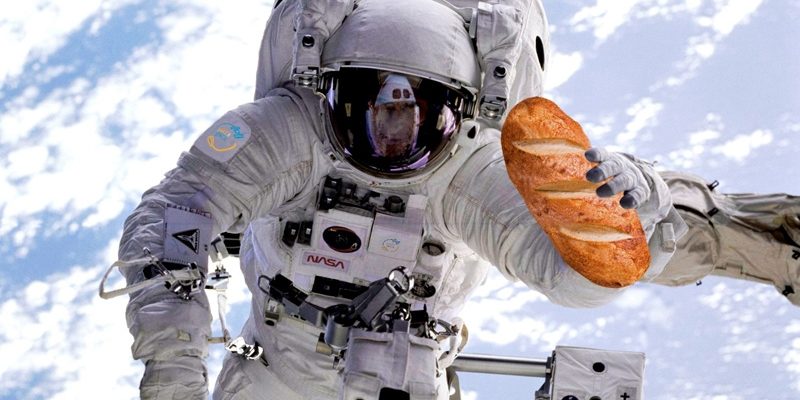Ever since an astronaut on a 1965 space mission smuggled aboard a sandwich and send crumbs flying towards sensitive electronic equipment, bread has been banned in space.
Now Sebastian Marcu, Interactive Multimedia MSc alumnus (Class of 2012) and founder of Bake in Space, is seeking to revolutionise food in space by developing a crumb-free bread. Here Sebastian explains the challenges behind the project and why it could change astronaut’s experience of space travel.
The current quality of life offered in the International Space Station is not a sustainable condition for humans. This is just one of the challenges that makes it difficult to send astronauts to the moon for extended periods of time and make space accessible for tourism.
As emotional beings, the environment plays a major role in creating a sense of well-being. Our civilisation on earth began with agriculture, and bread has accompanied our progress so much so that it has become a symbol for quality of life.
That’s why we at Bake in Space believe that bread is our stepping stone for the human exploration of space. We are reverse engineering the entire process of making bread, starting with the baking, with the goal of creating a freshly baked bread roll that is almost crumb-free.
Our tag line: “To boldly bake where no-one has baked before”, drives our project and in the future we hope to be able to offer the full scope of baked products which reminds astronauts of home.
Creating crumb-free bread for use in microgravity requires the right dough recipe in combination with the right baking process. But it is not the recipe alone. Some of the challenges that need to be tackled include:
- No surface that can be touched by an astronaut should be hotter than 45 degrees. This means we cannot pre-heat the oven and it needs to cool down before opening it.
- Opening the oven during the heating process may lead to a bubble of hot air being released in the station. This could potentially remain there as a hot air bubble and burn an astronaut if he/she flies through it.
- Crumbs could be released during the baking process, so the oven needs to be designed in a way to direct the hot air flow away from the heating elements. Otherwise the crumbs may get caught in there and could start to smoke or burn.
- The available power is only 270W (one tenth of the power used on earth for ovens), so the oven needs to be well-insulated to reach the desired temperature.
- The baking process will take longer due to the available power and the pre-heating and cool-down constraints. The baking process therefore risks drying out the bread roll so that it becomes too crumby again.
- The baking process needs to be designed in a way to ensure that water is added during the baking process and removed before opening the oven to ensure that the bread has not dried out.
My time at University of Westminster contributed to this venture by opening the doors for me to enter the space sector. I graduated with an MSc in Interactive Multimedia in 2002, and applied for a young graduate trainee role at the European Space Agency (ESA) in Cologne.
After seven years with the European Space Agency I decided to build my own company, Design & Data, providing outreach services to the space and science sectors. In order to kick-start a grassroots movement around space start-ups in Europe, Design & Data – along with a number of volunteers – organised the first European Start-up Weekend Space in Bremen in 2015. The event brought 80 people from 18 countries to spend the entire weekend together developing new space start-up business concepts.
Many great ideas came out of this weekend and some of the resulting start-ups are still active today. Since then we have begun various activities such as forming the platform Spaceoneers (www.spaceoneers.io) in order to create role models for entrepreneurs to aspire to so that others are encouraged to embark on the creation of commercial space ventures. The Bake in Space start-up (100% owned by Design & Data) is the pinnacle of our activities in this field.
As you can see life does not go in a straight line. My time at University of Westminster 15 years ago was a great starting point for launching my career in the space sector. At the time of my studies I had no clue what I would do next and if anyone had asked me if I would ever wind up in the space sector, I would probably have said a definite, “No never”. Funny how life goes if you keep an open mind and try out new things.
- Mentor the next generation - 1 August2018
- Making a difference in Hong Kong - 8 May2018
- My journey to Mumbai with Westminster Working Cultures - 15 March2018
